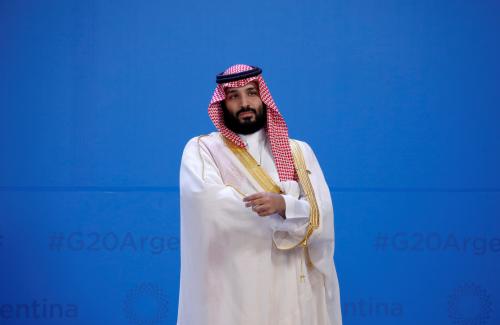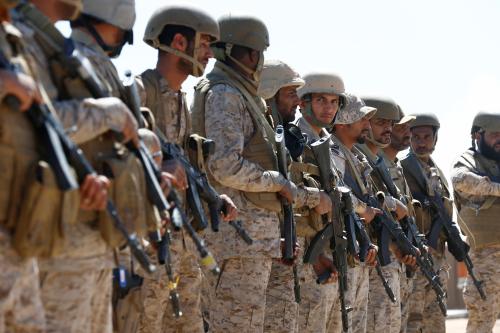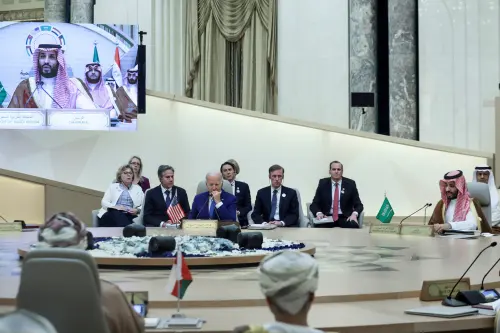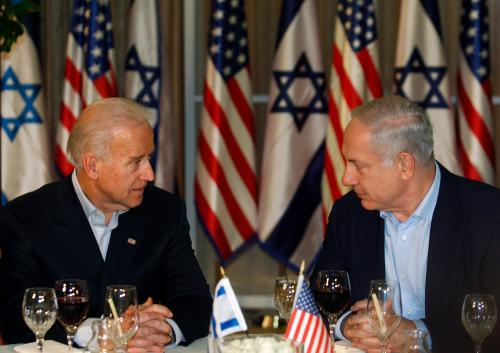The Saudi government yesterday announced a series of royal decrees that appointed a new foreign minister in place of the well-known Adel al-Jubeir, moved other officials into new positions, and established two new policymaking bodies, both headed inevitably by Crown Prince Mohammed bin Salman (MBS). The changes are intended to address the crisis that has erupted in its ties both to Washington and to international investors over the past few months. While insisting that there is no crisis, these moves are an admission by MBS of just how bad things have gotten. The depth of the problem is evident in the flight of foreign investors, the onslaught of bad press, the unprecedented Senate action rebuking the crown prince for his role in the murder of Jamal Khashoggi, and the promise by Senator Lindsey Graham to prevent any new weapons transfers as long as Mohammed bin Salman remains in charge.
But these changes to process and personnel alone will not provide the intended reassurance—to signal a real change in direction, the kingdom must demonstrate that its policy is shifting away from the aggressive overreach that led to the present dire straits.
Personnel changes
From almost the moment of Mohammed bin Salman’s appointment as defense minister in 2015, Gulf observers and elder statesmen expressed concerns that he was too young and inexperienced for the role, and that he would benefit from the advice and support of more seasoned (and older) advisers. This was not the path MBS took, however. He relied heavily on his ties to Mohammed bin Zayed, the crown prince of Abu Dhabi, and closed the Royal Court to all but a handful of close personal advisers like the now-notorious Saud al-Qahtani. (Qahtani reportedly helped organize Khashoggi’s murder, and has also been implicated in the reported torture in detention of female driving activists.)
Perhaps the most interesting and potentially important appointment is the new minister for National Guard, the commander of the Saudi Arabian National Guard (SANG), which is the monarchy’s preeminent protector. The SANG provides internal security for the kingdom. For over a half century it was the sinecure of former King Abdullah, who staffed it with his loyalists. He finally turned over control to his eldest son Prince Miteb. Miteb was ousted late last year in the Ritz-Carlton shakedown, when the crown prince detained without charge several hundred prominent Saudis and forced them to pay for their freedom.
King Salman appointed Prince Khalid bin Abdul Aziz al Muqrin to the job in late 2017. Khalid was a SANG veteran of 10 years and his family had a long association with the guard. But now he is out after barely a year. The new commander is Prince Abdullah bin Bandar bin Abdul Aziz. He was made deputy governor of Mecca province in April 2017. Like the crown prince, he is a graduate of King Saud University and has no military training or experience. He is a carbon copy, in many ways, of the crown prince.
The turnover in the SANG suggests trouble in the Praetorian Guard. Three commanders in just over one year is not a sign of stability. The appointment of an untrained and untested prince is a sign that personal loyalty, not experience or expertise, is still the crucial determinant of getting ahead. It also raises questions about the capability of the SANG to protect the country from domestic and foreign enemies.
One very important open post was not filled in the cabinet shuffle: deputy crown prince. The number-three slot has been vacant since Mohammad bin Salman moved up from deputy crown prince in 2017, sending Mohammad bin Nayef into house arrest. Clearly the crown prince does not want his small inner circle to include his successor.
That aside, this closed circle has been somewhat opened, and some old hands are in evidence. In addition to the appointment of a new National Guard commander, as well as longtime Saudi official Musaed al Aiban as “national security adviser,” the decrees also established a new “Council on Political and Security Affairs.” This new body will supposedly operate like an interagency advisory council for the crown prince, enabling diverse viewpoints and considerations to inform his national security policy.
the impact
Will it matter? Only if the new structure produces meaningful adjustments to Saudi policies that address international concerns and advance regional stability. Will the Saudi government now reverse some of its overreach, for example by releasing the dozens of peaceful civil society figures detained over the past two years, including the women driving activists arrested this spring and summer? Will this new process reduce the abuses of power that produced the Ritz-Carlton shakedown (of which the new foreign minister was briefly a victim), the kidnapping and forced resignation of the Lebanese prime minister, the murder of Jamal Khashoggi, and the climate of intimidation that now pervades Saudi society?
And then there’s the fate of the much-touted Saudi reform plan, Vision 2030. Even before Khashoggi’s murder put a spotlight on Saudi policy failures, foreign investors were skittish and foreign observers were warning of the plan’s stalled implementation. The new foreign minister, Ibrahim al Assaf, is a U.S.-trained economist who spent many years as the Saudi representative to the International Monetary Fund and the World Bank, as well as two decades as the kingdom’s finance minister (through 2016); he therefore has extensive time in Washington (as did Adel al-Jubeir, whom he replaces and who will now be a minister of state for foreign affairs).
Assaf was a proponent of state-led development during the kingdom’s boom times, and so longtime international investors reliant on steady government spending—like those in oil, gas, and construction—are likely to be pleased by his elevation to the lead player in foreign policy. His role may also auger an even stronger role for the Saudi government’s Public Investment Fund in driving domestic economic development—and thus more bad news for market liberalization, as well as for Saudi entrepreneurs and existing private businesses already feeling squeezed by the government’s economic dominance and the new value-added tax.
Mohammed bin Salman is still the decider in Saudi policy.
It was always the case that Vision 2030 faced opposition from Saudi elites threatened by disruptions to the old, top-down patronage networks that had connected prominent families and royals to the government’s economic activity and enriched them all. It may be that these forces capitalized on the crisis produced by the crown prince’s errors with respect to domestic dissent and foreign policy to try and pull back on market liberalization. The future of Saudi economic reform may now be slower, but it might also be based upon greater consensus.
Mohammed bin Salman is still the decider in Saudi policy. This week’s changes are worth watching, but the jury is still out on whether the crown prince has decided that his my-way-or-the-highway approach should be set aside in favor of one that, over time, may produce more stable and reliable outcomes for the kingdom and the region.
The Brookings Institution is committed to quality, independence, and impact.
We are supported by a diverse array of funders. In line with our values and policies, each Brookings publication represents the sole views of its author(s).







Commentary
Shuffling the deck chairs in Saudi Arabia
December 28, 2018